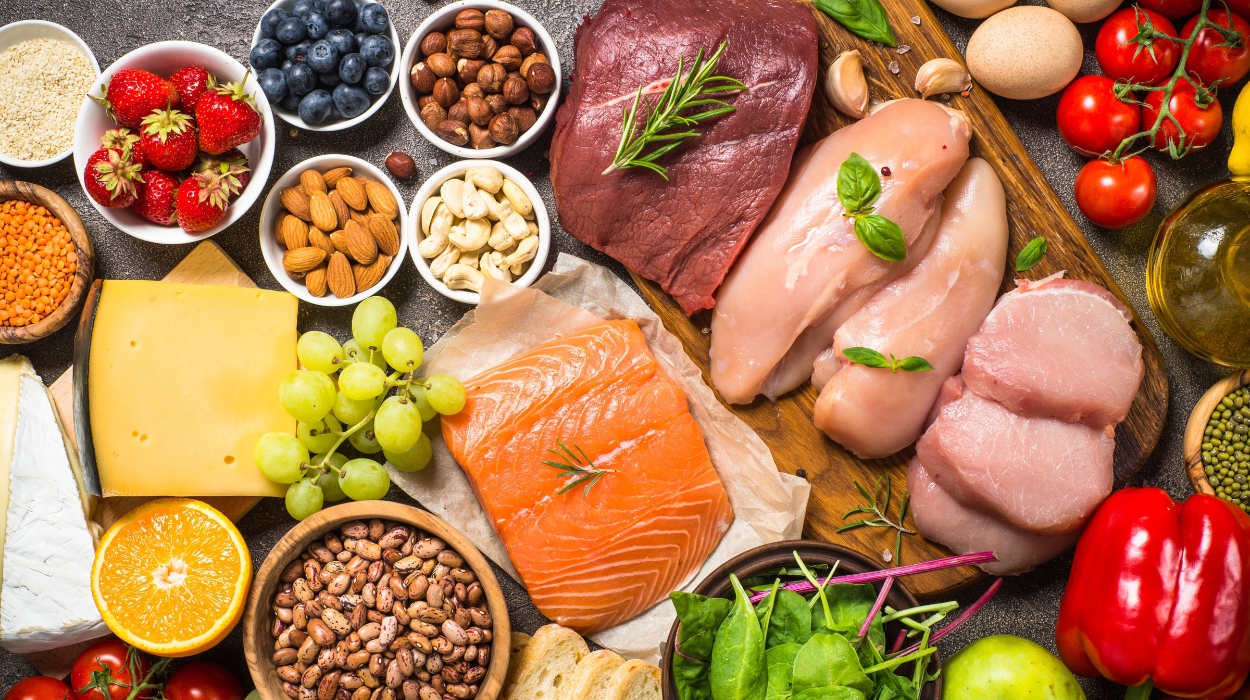 Expert's opinion
Expert's opinion
Expert's opinion
The article is a subjective view on this topic written by writers specializing in medical writing.
It may reflect on a personal journey surrounding struggles with an illness or medical condition, involve product comparisons, diet considerations, or other health-related opinions.
Although the view is entirely that of the writer, it is based on academic experiences and scientific research they have conducted; it is fact-checked by a team of degreed medical experts, and validated by sources attached to the article.
The numbers in parenthesis (1,2,3) will take you to clickable links to related scientific papers.
Hormones And Weight Loss: The Link Between Hormones & Weight 2024

Our bodies release hormones[1] to help regulate many functions. They are the chemical messengers in our bodies. Endocrine glands like our pancreas, the thyroid, the hypothalamus, and the pituitary gland produce hormones. These hormones then travel via the bloodstream to their specific target area to do their work. What about hormones and weight loss?
Certain hormones can affect many bodily functions related to weight maintenance, including energy production and satiety. Any malfunction in these metabolic processes involving hormonal balance may affect our body weight. So, how are hormones and weight loss related?
How Do Hormones Affect Weight Loss?
Hormones transmit messages in our bodies, regulating body functions. When a hormonal imbalance occurs, levels of your hormones are altered, as are the metabolic processes they regulate.
How do hormone levels and weight loss relate? When hormones are at the wrong levels in our bodies (too high or too low), they may affect hunger levels, emotions, and energy levels or cause fat to deposit in specific parts of our bodies, like the face or abdomen. If they are at optimal levels in our bodies, it is easier for us to manage our body weight.
9 Hormones That Affect Your Weight & Tips To Improve Them
Insulin
Insulin[2] is a hormone produced in the pancreas. Its main role is to control glucose use and storage in our muscle mass and fat tissue. Glucose is a sugar that serves as energy for our bodies and a source of calories in weight control. When the cells in our bodies have difficulty receiving the signals from insulin, it’s called insulin resistance.[3] This insulin resistance causes elevated blood sugar levels and can lead to you developing type 2 diabetes or pre-diabetes.[4] Both are health conditions that can lead to heart disease and unwanted weight gain.
Elevations in insulin levels cause the appetite to increase[5] our sensations of pleasant or sweet tastes, heighten, and increase food intake. This all adds up to unwanted body fat.
Leading a healthy lifestyle is the best way to improve or prevent insulin resistance and heighten insulin sensitivity. In addition, exercise is known to improve insulin sensitivity[6] and lower blood sugar levels. If you are overweight, losing 7% of your starting weight will be beneficial to improve insulin resistance. For example, if your current weight is 200 pounds, you can see some improvement if you lose around 14 pounds.
Leptin
Leptin[7] is an important hormone released by your fat cells that work on the brainstem and hypothalamus to regulate satiety. After food intake, leptin helps keep energy balance stable by letting our hunger center know we have eaten enough and can stop eating.
It has been found that people with obesity have high circulating leptin levels. In some studies,[8] they report decreased satiety, although leptin is present, which can indicate that leptin resistance might be the culprit. Losing weight may reverse leptin resistance. The hormone leptin is also known to facilitate the low-grade systemic inflammation[9] (including the brain and nervous system) associated with obesity. Indeed, the mechanism of action for leptin resistance in human obesity has been hypothesized to relate to the hypothalamic inflammation seen in the brain.
Caloric restriction may decrease leptin levels in your blood. Levels should normalize when energy expenditure equals energy consumption.
Ghrelin
This is our hunger hormone; it lets us know when we need to eat. Ghrelin[10] is produced in our stomach and hypothalamus; it stimulates food intake and releases growth hormones. Growth hormone[11] is known to stimulate the loss of total body fat and belly fat in particular.
People who are obese have low levels of ghrelin.[12] It is proposed that people with obesity are more sensitive to this hormone. In addition, decreasing calories for weight loss induces an increase in ghrelin levels. This makes it harder to lose weight, although levels may normalize in about 12 months.
To maintain normal levels of ghrelin eat at regular intervals; this makes sure levels increase with food intake and decrease after food consumption. Mindful eating[13] might also be a good practice. It helps you get in tune with your hunger and satiety cues to avoid overeating.
Neuropeptide Y Or NPY
NPY[14] is a neurotransmitter that potentiates appetite, building new fat cells and food intake. Its levels increase with food deprivation. It also affects gastrointestinal motility, promotes energy storage, and lowers blood glucose. It may be beneficial to follow a balanced diet without processed food to keep your levels of this hormone stable. In animal studies,[15] a high-fat, high-sugar diet increased NPY levels. Thus, following a lower fat and avoiding added sugar might be the way to achieve normal levels of this hormone.
Sumac powder, a spice popular in the Middle East, along with calorie restriction, may reduce NPY,[16] decrease leptin resistance, and increase insulin sensitivity in overweight and obese women. Three grams of sumac powder per day may help you lose weight and stabilize your blood sugar.[17]
Glucagon-Like Peptide-1 Or GLP-1
GLP-1[18] is another gut-produced hormone released when food is ingested and reaches the intestines. This hormone induces insulin secretion. GLP-1 is another agent[19] that helps maintain blood glucose levels and aids in satiety.
A good way to boost[20] your GLP-1 levels is by eating high-protein foods or using the Mediterranean diet.[21] Include foods like lean meats, fish, beans, or low-fat yogurt daily while avoiding excessive sugar. Finally, probiotic supplements[22] can help increase the levels of GLP-1 and help you eat less than you normally might. These approaches make sure the gut hormone GLP-1 can do its job correctly.
Peptide YY Or PYY
PYY[23] is a protein molecule produced in the intestines in response to feeding that is believed to be a signal for satiety. It can reduce food intake, especially after consuming fat and protein. PYY also helps decrease gastric emptying and intestinal transit, allowing for increased time for nutrient absorption.
Fermentation of carbohydrates in the intestines produces short-chain fatty acids like butyrate by the colonic microbiota. Polyphenols[24] from fruits and vegetables can also induce the secretion of GLP-1 and PYY, supporting the glucose-lowering effects of insulin after eating.
Cholecystokinin, Or CCK
CCK[25] is a hormone in our gut that supports satiety. It also plays a role in the digestion of proteins and fats by stimulating the pancreas to release enzymes. CCK particularly stimulates the gallbladder and the stomach to contract, regulating gastric emptying, satiety, and digestion. If there’s a problem with CCK satiety signaling, it can lead to the consumption of larger meals.
Keeping a healthy microbiome[26] might help maintain adequately functioning CCK. Eating plenty of high-fiber foods like whole grains, fruits, and vegetables serves as prebiotics and can feed the good bacteria in your gut. CCK is produced in abundance in response to a high-fat meal. CCK levels are also moderately stimulated by protein consumption.
Estrogen
Estrogen[27] is a group of sex hormones responsible for reproductive health. The hormone estrogen can affect cholesterol, blood glucose levels, bone mass, fat metabolism, and collagen production. For example, relative to weight loss, estrogen inhibits lipolysis,[28] thus preventing fat breakdown.
Elevated levels of estrogen are associated with excessive weight gain and irregular periods. On the other hand, menopause is caused by a decrease in ovarian estrogen secretion. These last changes in hormones usually occur when women reach their 40s and 50s and are associated with weight gain,[29] particularly increased fat storage in the abdomen.
Exercising and consuming a healthier diet may not affect estrogen levels. Although it may help you maintain a healthier weight and decrease the risk of cardiovascular disease that occurs with the onset of menopause.[30]
Cortisol
This hormone is known for our fight-or-flight response during stress, but it plays a role in body weight issues. The stress hormone cortisol itself is a steroid hormone that has many functions in the body, like controlling inflammation, controlling the metabolism of fats, proteins, and carbohydrates, and regulating your sleep-wake cycle, amongst others. Stress and high estrogen levels contribute to elevated cortisol levels.
Cushing’s syndrome occurs when there are higher-than-normal cortisol levels in the body. Symptoms include unexplained weight gain, especially on the face, high blood glucose, bone pain, skin symptoms, and high blood pressure. Treatment for high levels of cortisol will require medical treatment.
People that have poor sleep quality tend to have higher cortisol levels. Quality sleep along with regular exercise, can help lower cortisol[31] levels over time. In addition, since cortisol is a stress hormone, managing your stress levels can help maintain normal levels.
Treatment Options For Hormonal Imbalances
For most people, regulating their hormones for weight loss requires medical treatment. In other cases, achieving hormonal balance may just require small lifestyle changes.
Nutrition

Following a proper diet is a good way to start if you are interested in balancing your hormones, preventing hormonal weight gain, and losing weight. A lower-calorie diet can also support managing those hormones if you are overweight, particularly for those individuals that could benefit from appetite control. Decreasing just 500 calories[32] per day can support the gradual and sustainable weight loss of approximately one pound per week.
Physical Activity
Meeting the daily recommendation of physical activity[33] can help improve hormone resistance. Not only that, but it can also help you achieve/maintain healthy weight management so hormones can work efficiently. Performing at least 150 minutes per week of moderate to vigorous intensity physical activity[34] is optimal for hormonal balance.
Physical activity can lower cortisol, reduce insulin resistance, and lower blood sugar while expanding calories and boosting metabolism. Burning extra calories will help with losing unwanted fat weight.
Stress Management
Chronic stress[35] can affect our food choices and behavior around food. Work with a therapist if you suffer from high-stress levels. Chronic stress, like ones from unhealthy relationships, financial burdens, or others, can also damage our bodies and increase our cortisol. Consider breathing exercises, yoga, and fun hobbies or activities to help manage your stress.
Sleep
Poor quality sleep is associated with developing chronic diseases and obesity. It may also be related to changes in appetite-regulating hormones following sleep deprivation. Adults are recommended to get enough sleep of 7 hours or more per day[36] for overall health.
Medical Treatment
Some hormonal dysfunctions in our body require pharmacological and/or medical treatment. Work with your medical provider on strategies to manage your hormones and support weight loss.
The Bottom Line
Hormone changes can cause you to gain weight and, in some cases, lose weight unwantedly. When hoping to balance your hormones for weight loss, following a sensible nutritious diet such as recommended by the Dietary Guidelines for Americans,[37] and practicing physical activity most days is a good start. Managing your stress, getting quality sleep, and enjoying some good hobbies might improve hormonal imbalances in your body.
+ 37 sources
Health Canal avoids using tertiary references. We have strict sourcing guidelines and rely on peer-reviewed studies, academic researches from medical associations and institutions. To ensure the accuracy of articles in Health Canal, you can read more about the editorial process here
- Medlineplus.gov. (2016). Hormones. [online] Available at: https://medlineplus.gov/hormones.html.
- Thota, S. and Akbar, A. (2022). Insulin. [online] Nih.gov. Available at: https://www.ncbi.nlm.nih.gov/books/NBK560688/.
- CDC (2022). Insulin Resistance and Diabetes. [online] Centers for Disease Control and Prevention. Available at: https://www.cdc.gov/diabetes/basics/insulin-resistance.html.
- CDC (2021). Prediabetes – Your Chance to Prevent Type 2 Diabetes. [online] Centers for Disease Control and Prevention. Available at: https://www.cdc.gov/diabetes/basics/prediabetes.html.
- Fereshteh Aliasghari, Neda Lotfi Yaghin and Mahdavi, R. (2019). Relationship between hedonic hunger and serum levels of insulin, leptin and BDNF in the Iranian population. [online] 199, pp.84–87. doi:https://doi.org/10.1016/j.physbeh.2018.11.013.
- Standards of Medical Care in Diabetes—2022 Abridged for Primary Care Providers. (2022). [online] 40(1), pp.10–38. doi:https://doi.org/10.2337/cd22-as01.
- Cui, H., López, M. and Rahmouni, K. (2017). The cellular and molecular bases of leptin and ghrelin resistance in obesity. Nature Reviews Endocrinology, [online] 13(6), pp.338–351. doi:https://doi.org/10.1038/nrendo.2016.222.
- Liu, J., Yang, X., Yu, S. and Zheng, R. (2018). The Leptin Resistance. [online] pp.145–163. doi:https://doi.org/10.1007/978-981-13-1286-1_8.
- Martelli, D. and Brooks, V.L. (2023). Leptin Increases: Physiological Roles in the Control of Sympathetic Nerve Activity, Energy Balance, and the Hypothalamic–Pituitary–Thyroid Axis. [online] 24(3), pp.2684–2684. doi:https://doi.org/10.3390/ijms24032684.
- Mohamed, M. (2015). Ghrelin – Physiological Functions and Regulation. [online] 11(2), pp.90–90. doi:https://doi.org/10.17925/ee.2015.11.02.90.
- Michael Højby Rasmussen (2010). Obesity, growth hormone and weight loss. [online] 316(2), pp.147–153. doi:https://doi.org/10.1016/j.mce.2009.08.017.
- Zigman, J.M., Bouret, S.G. and Andrews, Z.B. (2016). Obesity Impairs the Action of the Neuroendocrine Ghrelin System. Trends in Endocrinology & Metabolism, [online] 27(1), pp.54–63. doi:https://doi.org/10.1016/j.tem.2015.09.010.
- Nelson, J.B. (2017). Mindful Eating: The Art of Presence While You Eat. [online] 30(3), pp.171–174. doi:https://doi.org/10.2337/ds17-0015.
- Holzer, P., Reichmann, F. and Aitak Farzi (2012). Neuropeptide Y, peptide YY and pancreatic polypeptide in the gut–brain axis. [online] 46(6), pp.261–274. doi:https://doi.org/10.1016/j.npep.2012.08.005.
- Myrtille C.R. Gumbs, van and Susanne (2016). The effect of obesogenic diets on brain Neuropeptide Y. [online] 162, pp.161–173. doi:https://doi.org/10.1016/j.physbeh.2016.04.049.
- Hariri, N., Sahar Darafshi Ghahroudi, Jahangiri, S., Asal Ataie-Jafari, Hosseinzadeh, N., Behnaz Abiri and Atoosa Saidpour (2023). Sumac (Rhus coriaria L.) powder supplementation has beneficial effects on appetite in overweight/obese women with depression: A randomized controlled trial. [online] 51, pp.101734–101734. doi:https://doi.org/10.1016/j.ctcp.2023.101734.
- Shidfar, F., Rahideh, S.T., Rajab, A., Khandozi, N., Hosseini, S., Shidfar, S. and Mojab, F. (2014). The Effect of Sumac (Rhus coriaria L.)Powder on Serum Glycemic Status, ApoB, ApoA-I and Total Antioxidant Capacity in Type 2 Diabetic Patients. Iranian journal of pharmaceutical research : IJPR, [online] 13(4), pp.1249–55. Available at: https://www.ncbi.nlm.nih.gov/pmc/articles/PMC4232791/.
- Timo Müller, Finan, B., Bloom, S.R., D’Alessio, D.A., Drucker, D.J., Flatt, P., Fritsche, A., Gribble, F.M., Grill, H.J., Habener, J.F., Holst, J.J., Langhans, W., Meier, J.J., Nauck, M.A., Perez-Tilve, D., Alessandro Pocai, Reimann, F., Sandoval, D.A., Schwartz, T.W. and Seeley, R.J. (2019). Glucagon-like peptide 1 (GLP-1). [online] 30, pp.72–130. doi:https://doi.org/10.1016/j.molmet.2019.09.010.
- Davis, E. and Sandoval, D.A. (2020). Glucagon‐Like Peptide‐1: Actions and Influence on Pancreatic Hormone Function. [online] pp.577–595. doi:https://doi.org/10.1002/cphy.c190025.
- Warrilow, A., Mellor, D., McKune, A.J. and Pumpa, K. (2018). Dietary fat, fibre, satiation, and satiety—a systematic review of acute studies. [online] 73(3), pp.333–344. doi:https://doi.org/10.1038/s41430-018-0295-7.
- A. Di Mauro, Tuccinardi, D., Watanabe, M., Rossella Del Toro, Lavinia De Monte, Giorgino R, Rampa, L., Rossini, G., Shadi Kyanvash, Soare, A., Rosati, M.M., Piccoli, A., Napoli, N.J., Fioriti, E., Paolo Pozzilli, Yeganeh Manon Khazrai and Manfrini, S. (2020). The Mediterranean diet increases glucagon‐like peptide 1 and oxyntomodulin compared with a vegetarian diet in patients with type 2 diabetes: A randomized controlled cross‐over trial. [online] 37(6). doi:https://doi.org/10.1002/dmrr.3406.
- Yadav, H., Lee, J.-H., Lloyd, J.K., Walter, P.J. and Rane, S.G. (2013). Beneficial Metabolic Effects of a Probiotic via Butyrate-induced GLP-1 Hormone Secretion. [online] 288(35), pp.25088–25097. doi:https://doi.org/10.1074/jbc.m113.452516.
- Romaní-Pérez, M., Bullich-Vilarrubias, C., Inmaculada López-Almela, Liébana-García, R., Olivares, M. and Sanz, Y. (2021). The Microbiota and the Gut–Brain Axis in Controlling Food Intake and Energy Homeostasis. [online] 22(11), pp.5830–5830. doi:https://doi.org/10.3390/ijms22115830.
- Castro-Barquero, S., Rosa Maria Lamuela-Raventós, Mónica Doménech and Estruch, R. (2018). Relationship between Mediterranean Dietary Polyphenol Intake and Obesity. [online] 10(10), pp.1523–1523. doi:https://doi.org/10.3390/nu10101523.
- Sayegh, A.I. (2013). The Role of Cholecystokinin Receptors in the Short-Term Control of Food Intake. [online] pp.277–316. doi:https://doi.org/10.1016/b978-0-12-386933-3.00008-x.
- Sun, L., Li, J. and Nie, Y. (2020). Gut hormones in microbiota-gut-brain cross-talk. [online] 133(7), pp.826–833. doi:https://doi.org/10.1097/cm9.0000000000000706.
- Delgado, B.J. and Lopez-Ojeda, W. (2022). Estrogen. [online] Nih.gov. Available at: https://www.ncbi.nlm.nih.gov/books/NBK538260/.
- Luglio HF (2014). Estrogen and body weight regulation in women: the role of estrogen receptor alpha (ER-α) on adipocyte lipolysis. Acta medica Indonesiana, [online] 46(4). Available at: https://pubmed.ncbi.nlm.nih.gov/25633552/.
- Franck Mauvais-Jarvis, Clegg, D.J. and Hevener, A.L. (2013). The Role of Estrogens in Control of Energy Balance and Glucose Homeostasis. [online] 34(3), pp.309–338. doi:https://doi.org/10.1210/er.2012-1055.
- Lizcano, F. and Guzmán, G. (2014). Estrogen Deficiency and the Origin of Obesity during Menopause. [online] 2014, pp.1–11. doi:https://doi.org/10.1155/2014/757461.
- Len De Nys, Anderson, K., Esther Frema Ofosu, Ryde, G., Connelly, J. and Whittaker, A.C. (2022). The effects of physical activity on cortisol and sleep: A systematic review and meta-analysis. [online] 143, pp.105843–105843. doi:https://doi.org/10.1016/j.psyneuen.2022.105843.
- Raynor, H.A. and Champagne, C.M. (2016). Position of the Academy of Nutrition and Dietetics: Interventions for the Treatment of Overweight and Obesity in Adults. [online] 116(1), pp.129–147. doi:https://doi.org/10.1016/j.jand.2015.10.031.
- Halliday, T.M., White, M.H., Hild, A., Conroy, M.B., Melanson, E.L. and Cornier, M.-A. (2021). Appetite and Energy Intake Regulation in Response to Acute Exercise. [online] 53(10), pp.2173–2181. doi:https://doi.org/10.1249/mss.0000000000002678.
- Physical Activity Guidelines for Americans Summary. (n.d.). Available at: https://health.gov/sites/default/files/2019-10/PAG_ExecutiveSummary.pdf.
- Rica, N., Astrup, A., Mads Fiil Hjorth, Anders Sjödin, L. Pijls and C. Rob Markus (2017). Does stress influence sleep patterns, food intake, weight gain, abdominal obesity and weight loss interventions and vice versa? [online] 19(1), pp.81–97. doi:https://doi.org/10.1111/obr.12603.
- CDC (2022). How Much Sleep Do I Need? [online] Centers for Disease Control and Prevention. Available at: https://www.cdc.gov/sleep/about_sleep/how_much_sleep.html.
- Health.gov. (2023). Dietary Guidelines for Americans | health.gov. [online] Available at: https://health.gov/our-work/nutrition-physical-activity/dietary-guidelines.



